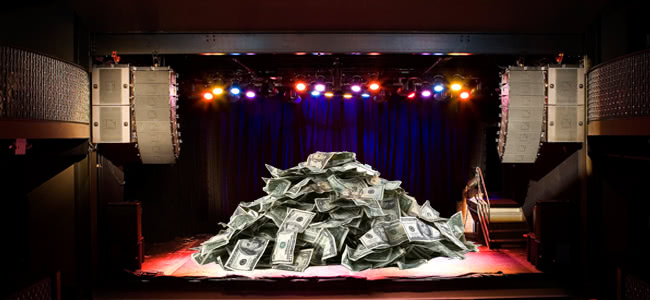Tone Deaf has written in the past about the scourge of pay-for-play music festivals and events. Like any industry, music has its share of ugly blemishes that mar what is otherwise a culture built around passion.
For those unfamiliar with unscrupulous practice, a pay-for-play is an event that asks the bands performing on the lineup to pay for the privilege instead of playing in exchange for payment or exposure.
The number of pay-for-play festivals has been declining thanks to the internet’s role in helping bands and punters become more informed about the practice, but they certainly haven’t died off.
In fact, if a new report by the Australian Financial Review is anything to go by, it may be about to hit the stock market. At least, that’s what the people behind a new app dubbed Megastar Millionaire are hoping to achieve.
The app is the brainchild of an Aussie and an American entrepreneur, who teamed up to create an online talent quest in which the winning performer is handed one million dollars. Of course, there’s a catch or two.
The app basically works like a reality talent contest on television, just without the television. The public votes for artists, whether they be singers, extreme sports stars, or performers, via premium SMS.
Acts who wish to participate in a given season of the competition upload videos of their performance for a fee, but will need a minimum number of fans to qualify for the season. Whoever gets the most votes is awarded $1 million.
It does sound remarkably similar to pay-for-play, but updated for the 21st century and spliced with a reality talent show. Instead of paying to take the stage in front of a crowd of ticket-buyers, you’re paying to upload your video to an app in the hopes of participating in a talent show.
What’s more, the two minds behind the app, Adam Wellisch and Dion Sullivan, want to list it on the Australian Stock Exchange (ASX) and have racked up a string of big investors.
“Instead of paying to take the stage in front of a crowd of ticket-buyers, you’re paying to upload your video to an app in the hopes of participating in a talent show.”According to AFR, Megastar Millionaire will reverse-list on the ASX in November through the shell of Minerals Corporation, but has to raise up to $7 million to help build the technology infrastructure and fund the prize first.
“We’re building the first season as a proof of concept and the intention is to then take it to the States on the Nasdaq,” Sullivan told AFR, who report the app has attracted the support of US tech investor Doug Barry, a founding investor in Pandora.
So far we’ve got a mining company and one of the founding investors of an infamous streaming service, add to that Hollywood producer John Baldecchi and digital gaming executive Michael Pole.
Meanwhile, the competition is set to launch in the US in late 2016, with plans to roll it out in Australia, New Zealand, and Asia. “The intention is to roll it out in every continent that has heavy mobile penetration and secure internet service provider protocols,” Sullivan said.
“It will work like any other entertainment format, and the competition will run for 16 weeks.” During the 16 weeks, viewers will be able to watch the performances of the artists online and vote for them to make the top 12.
[include_post id=”448102″]
The final 12 will be mentored by industry leaders and showcased on the Megastar Millionaire platform. The eventual winner will be judged by an independent panel and awarded $1 million, while four emi-finalists will receive $25,000, and the top 12 will have the chance to audition for a film through Digital Riot Studios.
“We’ve spoken to high-calibre entertainment executives from music and film who are looking for ways to discover the next Taylor Swift,” Sullivan said. “What we’re building is a platform that will let your brand and fan base go through the roof.”
According to AFR, the platform’s revenue will be generated through a freemium subscription platform, advertising, and reselling big data. Guess they forgot to mention the premium SMS fees and the fees paid by bands just to “audition”.
So what do you think? Is this fair for the musician, or just another pay-for-play dressed up as an incredible opportunity for musicians?




































